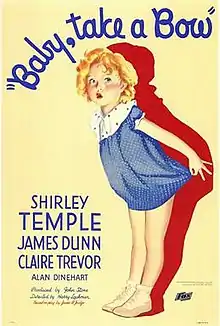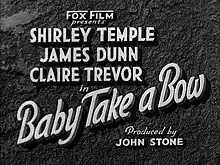Baby Take a Bow
Baby, Take a Bow is a 1934 American comedy drama film directed by Harry Lachman and is one of the earliest Hays code Hollywood films (its MPAA certificate marks it as the third ever code-approved film).[1] The screenplay by Philip Klein and Edward E. Paramore Jr. is based on the 1926 play Square Crooks by James P. Judge. Shirley Temple plays the child of an ex-convict (James Dunn) trying to make a better life for himself and his family. The film was a commercial success and is critically regarded as pleasant and sentimental.[2] A musical number features Dunn and Temple.
| Baby, Take a Bow | |
|---|---|
 Theatrical release poster | |
| Directed by | Harry Lachman |
| Produced by | John Stone |
| Written by | John V. A. Weaver William Conselman Henry Johnson |
| Screenplay by | Philip Klein Edward E. Paramore Jr. |
| Based on | Square Crooks 1926 play by James P. Judge |
| Starring | Shirley Temple James Dunn Claire Trevor Alan Dinehart |
| Music by | Samuel Kaylin David Buttolph |
| Cinematography | L. William O'Connell |
| Edited by | Alfred DeGaetano Al De Gaetano |
| Distributed by | Fox Film |
Release date |
|
Running time | 76 minutes |
| Country | United States |
| Language | English |
Plot
After serving time in Sing Sing, Eddie Ellison (James Dunn) marries his fiancée Kay (Claire Trevor) and eventually the two have a daughter they name Shirley (Shirley Temple). Eddie helps his friend, and former convict, Larry Scott (Ray Walker), who is engaged to Shirley's dance instructor Jane (Dorothy Libaire), get a job as a chauffeur for his employer, factory owner Stuart Carson (Richard Tucker).
Trigger Stone (Ralf Harolde), who also served time in Sing Sing, steals Mrs. Carson's (Olive Tell) pearl necklace and asks Eddie and Larry to sell it for him, but they refuse. Private investigator Welch (Alan Dinehart), the man responsible for Eddie's conviction, tells the head of the National Insurance Company he suspects the chauffeurs are guilty of the robbery and informs Mr. Carson about their prison records, prompting him to fire them.
Trying to escape from the police, Trigger gives the pearl necklace to Shirley, who believes it is a belated birthday present. As part of a game, she hides it in her father's pocket, and when he finds it while Welch is searching the apartment, he conceals it in the carpet sweeper, but unbeknownst to him, the neighbor's maid Anna (Lillian Stuart) borrows and empties it before returning it. Kay returns home, and when she hears the story, they try to open the sweeper. Welch returns and opens it himself, only to find it empty.
After Welch leaves, Eddie, Larry, Kay and Jane search the apartment building for the necklace. When Trigger threatens Eddie with a gun, Eddie subdues him and ties him up, then goes for the police. During his absence, Shirley discovers the necklace in the garbage can downstairs. She brings it to Eddie but instead finds Trigger, who convinces her to let him free. He takes her hostage and climbs to the roof, where he shoots Eddie. Although injured, Eddie manages to capture Trigger. Shirley takes the necklace from Trigger's pocket, and detective Flannigan (James Flavin) tells her she will be eligible for the $5,000 reward.
Cast
- Shirley Temple as Shirley Ellison a 6-year-old girl
- James Dunn as Eddie Ellison a 32-year-old man
- Claire Trevor as Kay Ellison
- Alan Dinehart as Welch
- Ray Walker as Larry Scott
- Dorothy Libaire as Jane Scott
- Ralf Harolde as Trigger Stone
- James Flavin as Det. Flannigan
- Richard Tucker as Stuart Carson
- Olive Tell as Mrs. Carson
Production

James P. Judge's play Square Crooks was filmed under that title in 1928 by Lewis Seiler. The working titles for the remake were Always Honest and Going Straight. Both The Hollywood Reporter and Variety reported the film was banned in Germany, although no reason was given by the German censors.[3]
The song "On Account-a I Love You" was written by Sam H. Stept and Bud Green[4] and sung by Temple and Dunn.[2] The dress that Temple wore on film while singing this song was part of a 2015 exhibition, Love, Shirley Temple. The exhibition, which toured among several US locations, also included other dresses Temple wore between 1928 and 1941 as well as other memorabilia from this time.[5][6] Items from the exhibition were auctioned off in July 2015 and this dress sold for $52,000.[7]
Based on the success of Little Miss Marker and Stand Up and Cheer!, Temple's Fox salary was raised to $1250 per week and her mother's salary, as coach and hairdresser, was raised to $150 per week.[2] The film's title was taken from a song Temple had sung in Stand Up and Cheer!. Temple and Dunn would work together in one other film, Bright Eyes, with Temple taking top billing each time.[8]
Release
.jpg.webp)
Critical reception
Temple biographer Anne Edwards thought the film "pleasant, sentimental" and that it "had very little other than Shirley to recommend it at the box office."[8]
Channel 4 called the film a "slender but cute tale" that is "slow for the most part, but a scene on a rooftop where the real baddie uses the tot as a human shield should amuse." [11]
TV Guide rated the film two out of four stars and commented, "Forget the plot and enjoy the child star in one of her most entertaining roles." [12]
Home media
In 2009, the film was available on videocassette and DVD in both the original black and white and in computer-colorized versions. Some editions had special features and theatrical trailers.
References
- "Hollywood Code film numbers". Retrieved July 12, 2018.
- Windeler, Robert (1992) [1978]. The Films of Shirley Temple. New York: Carol Publishing Group. p. 135. ISBN 0-8065-0725-X.
- Baby Take a Bow at Turner Classic Movies
- https://www.imdb.com/title/tt0024854/soundtrack?ref_=tt_trv_snd
- Broaddus, Will (2015-05-07). "Shirley Temple exhibit stops at Wenham Museum". Eagle-Tribune. North Andover, Massachusetts. Retrieved 2016-04-26.
- "Frazier Museum Selected to Host Love, Shirley Temple". Kentucky Monthly. Archived from the original on 2016-04-26. Retrieved 2016-04-26.
- Newman, Meredith (2015-07-14). "Shirley Temple dress is sold for $75,000 at auction in Kansas City". The Kansas City Star. Kansas City, Missouri. Retrieved 2016-04-26.
- Edwards, Anne (1988). Shirley Temple: American Princess. New York: William Morrow and Company, Inc. p. 66.
- D. W. (Nov 25, 1934). "TAKING A LOOK AT THE RECORD". New York Times. ProQuest 101193306.
- DOUGLAS W. CHURCHILL.HOLLYWOOD. (Dec 30, 1934). "THE YEAR IN HOLLYWOOD: 1984 May Be Remembered as the Beginning of the Sweetness-and-Light Era". New York Times. p. X5.
- Channel 4 review
- TV Guide review
